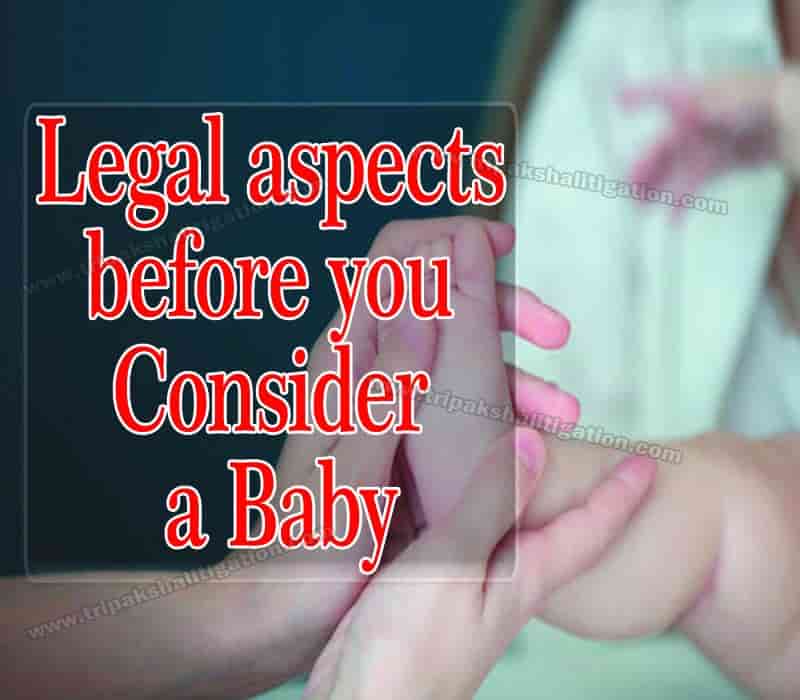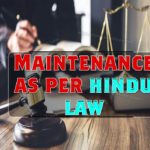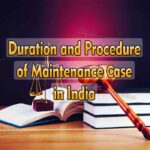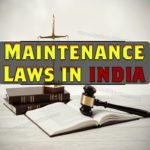Marriage is the base of a family structure and it creates a basic social unit. Both marriage and family form the social status of people that are sanctioned by society. In India, we have different sets of family laws for persons belonging to different religions. These are called personal laws. Certain aspects like solemnization & validity of the marriage, dissolution of marriage, maintenance, custody of children, guardianship, adoption, etc. are governed by law. It aims to preserve and strengthen the institutions of marriage and family, to ensure the welfare of children in case of marital breakdown, and to use the law as a vehicle to bring about social change and empower women.
Changed concept of marriage and family
The concept of marriage and family has changed with time and another concept of divorce has evolved which was not known to anybody earlier. Divorce may be defined as the final termination of a marital relationship that makes the legal duties null and void. Hence, if you don’t have a sound relationship with your spouse then plan your family wisely as there are many repercussions of the same on a child’s psychology.
Also, you need to manage your finances before having a child as there are many obligations of a parent towards a child. As a parent, you have a responsibility towards your child. This means that you have to provide the child with food, care, educate and shelter. You are also the child’s legal representative.
Planning to extend your family consider the following legal aspects before you plan to extend your family by having a baby:
Issues about divorce and child welfare
The legal process of divorce consists of many issues that comprise child custody, maintenance, alimony, etc. The researchers take into account the adverse consequences of divorce that deal with the economic challenges, psychological impact, and side-effects on children due to the separation of their parents. Divorce of parents has major physiological effects on children that are impairing in nature; they face emotional distress due to the separation of their parents.
Welfare of Children: Custody issues
The Guardian and Wards Act 1890 is a complete code that defines the rights and liabilities of guardians and wards. The Act applies to minor children and it is a secular Act. While approving and declaring a minor’s guardian, the court considers the minor’s personal law. The term ‘custody’ is a specific refers to the minor’s upbringing/care and overall development. In Shri Rajinder Kumar Mishra v. Shrimati Richa[i], the court held that the child’s welfare is of paramount consideration while dealing with the issue of custody. The court has to decide the best interest of the child while granting custody.
In Vasudha Sethi & Ors v. Kiran V Bhaskar & Anr[ii]– Justices Ajay Rastogi and Abhay S Oka stated while dealing with the issue of child custody and repatriation of the child to the home country should be dealt with considering child’s welfare[iii]. The Supreme Court emphasized that in such cases the child’s welfare is paramount and parent’s rights are secondary.
In Ruchi Majoo v. Sanjeev Majoo[iv]– The Apex Court held that the judgment by a foreign court should only be taken as input for its final adjudication. The court permitted the trial court to hear the mother’s application for the child’s custody. The priority is given to the welfare of the child.
Maintenance Guidelines by the Supreme Court
In the case of Rajesh v. Neha[v], the Apex gave the following guidelines while awarding maintenance:
- Overlapping authority under separate Act for payment of maintenance;
- Interim maintenance is to be paid;
- Requirements for deciding the quantum of maintenance;
- Date from which maintenance is to be awarded;
- Strict compliance with maintenance orders while adjudicating the case.
Child Maintenance after Divorce: Legal obligation
A mother can claim maintenance from a child’s father after the divorce. Parents have a legal obligation to maintain their children born out of a marriage, after divorce by providing financial support until the child is dependent upon the parents.
Section 125 of the Criminal Procedure Code (CrPC) requires the father to provide maintenance to the wife, children, and his parents. Section 125 of CrPC states that:
If any person having sufficient means neglects or refuses to maintain;
- his wife, unable to maintain herself, or
- his legitimate or illegitimate minor child, whether married or not, unable to maintain itself, or
- his legitimate or illegitimate child (not being a married daughter) who has attained majority, where such child is, because of any physical or mental abnormality or injury unable to maintain itself, or
- his father or mother, unable to maintain himself or herself,
Section 20 of the Hindu Adoption and Maintenance Act, 1956 (Act) deals with the maintenance of the child and aged parents. This provision says that a Hindu is bound, during his or her lifetime, to maintain his or her legitimate or illegitimate children and his or her aged or infirm parents. A wife can demand from her husband to pay child support after divorce by filing a petition under these laws in the family court which has jurisdiction over the area where she and her children reside[vi].
The Supreme Court bench comprising of Justices MR Shah and AS Bopanna stated that “In a dispute between husband and wife the liability and responsibility of the father to maintain the child continues till the son attains the age of majority. It also cannot be disputed that the son has a right to be maintained as per the status of his father”[vii].
Children of void marriage entitled to maintenance
It must be noted that a child born out of a void marriage shall be a legitimate child and shall be entitled to maintenance under Section 125 CrPC, as held in the case of Bakulabai v. Gangaram[viii]. You are bound to maintain your child and there is no difference in the eyes of law between a legitimate and illegitimate child when it comes to the obligation of maintenance.
Father to maintain the unmarried daughter
It is noteworthy that a father has to maintain her unmarried daughter who is not able to maintain herself even if she is living separately with their mother, held in the case of Jasbir Kaur Sehgal v. District Judge, Dehradun[ix].
In Jagdish Jugtawat v. Manju Lata[x]– The Court held that a daughter is entitled to maintenance even after she attains majority till the time she gets married.
Hindu earning mother is also obliged to maintain children
The court has stated in the case of Padmja Sharma v. Ratan Lal Sharma[xi] that both the parents are obliged to contribute to the child’s expenses where a mother is working she is equally liable to pay for the child’s expenses. A father is not exclusively responsible to maintain children regardless of the mother being affluent.
In Amarendra Kumar Paul v. Maya Paul[xii]– The court clarified that a case for grant of maintenance u/s 125 of the CrPC only arises when a person having sufficient means neglects or refuses to maintain his minor children who are unable to maintain themselves.
Muslim children entitled to maintenance under CrPC
The benefit under Section 125 CrPC is available to all children irrespective of religion. Right under Muslim Women (Protection of Rights on Divorce) Act, 1986 is that of the mother to claim maintenance for children for two years from their date of birth and is distinct and independent of the right to maintenance under CrPC to minor children unable to maintain themselves[xiii].
In Noor Sabha Khatoon v. Mohd. Quasim[xiv]– The court held that the Muslim children are entitled to maintenance under the CrPC. The benefit of Sec. 125 is available to all children irrespective of religion. Under the Muslim Women (Protection of rights on Divorce) Act, 1986, the mother can claim maintenance for children for two years from their date of birth and it is distinct and independent of the right to maintenance under CrPC to minor children who are unable to maintain themselves.
When can the stepmother claim maintenance from her stepson?
A childless stepmother may claim maintenance from her stepson provided she is a widow or her husband, if living, is incapable of supporting and maintaining her[xv].
Both the parents have equal rights over the child and they have an equal obligation to maintain the child. For a child both the parents are equally important whom they love unconditionally. It is really bad for the psychological growth of a child and mental torture for them and this can never be justified[xvi].
Nowadays divorce is growing at a very high pace and it not only destroys the life of two people but it destroys the whole family. It hampers ones’ personal growth and professional life as well. We always fail to realize that the divorce of parents ruins the lives of children who have no-fault, but they are the biggest victims of domestic litigation. Children are the worst sufferers in matrimonial litigation and they are the aggrieved ones’ when a dispute occurs between their parents. Hence, always plan a family wisely.
[i] AIR 2005 All 379
[ii] CRIMINAL APPEAL NO. 82 OF 2022
[iii] https://lawtrend.in/rights-of-parents-not-important-the-welfare-of-child-most-important-in-custody-battles-sc/
[iv] (2011) 6 SCC 479
[vi] https://www.legistify.com/blogs/view_detail/child-maintenance-after-divorce-in-india-from-husband/
[vii] https://economictimes.indiatimes.com/news/india/liability-of-father-to-maintain-child-continues-till-the-son-attains-age-of-majority-supreme-court/articleshow/88036143.cms?from=mdr
[xiii] Noor Saba Khatoon v. Mohd. Quasim, (1997) 6 SCC 233
[xiv] (1997) 6 SCC 233
[xv] Kirtikant D. Vadodaria v. the State of Gujarat, (1996) 4 SCC 479
[xvi] https://blog.ipleaders.in/status-parental-obligation-child-support-india/








